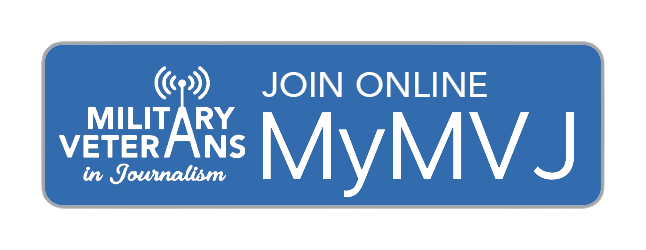

MVJ President Russell Midori addresses event attendees. Photo courtesy of Ryan Ruggiero of NBC.
About 50 military veterans and media personnel attended From Frontlines to Headlines, an event co-hosted by NBC and Military Veterans in Journalism at NBC headquarters in Manhattan to allow veterans in journalism to network with top media professionals from NBC and to highlight the importance of getting more vets in journalism.
Cesar Conde, chairman of the NBCUniversal News Group, welcomed attendees to 30 Rock, after which MVJ President Russell Midori encouraged the attending veterans to take full advantage of the chance to build their networks.
The NBCUniversal team held the event with MVJ to diversify their newsroom so that their staff more accurately reflects their audience across platforms. Only two percent of journalists are military veterans, yet eight percent of Americans have served in the armed forces.
Addressing the group, Lucy Bustamante, an Emmy-winning morning anchor and journalist for NBC10, breaking news anchor for Telemundo62 and Navy spouse, expressed the value NBCUniversal places on the service of military veterans and the company’s appreciation for the diversity of experiences veterans bring to the workforce. Bustamante then moderated a four-person panel of military veteran NBC employees who spoke about their experiences.

Event attendees listened to each of the panelists speak at the “From Frontlines to Headlines” event. Photo courtesy of Ryan Ruggiero of NBC.
The first of these speakers was NBC News and MSNBC Senior Medical Correspondent Dr. John Torres, who discussed his experience in the Air Force and how it has helped his civilian career. Torres grew up as an Air Force brat before attending the Air Force Academy, where he became a commissioned officer upon graduation. After serving several years as a pilot, Torres answered his calling to become a physician and has since traveled worldwide to provide medical care and humanitarian aid. Torres now combines his medical knowledge and skills from service to bring depth and trust to NBC’s medical coverage. On the side, he also instructs NATO Special Forces in combat and medical skills.
The second panelist to speak was Patrick Martin, a multimedia journalist and producer with the NBC News medical unit. An Afghanistan veteran who served with the 82nd Airborne, Martin’s mission after service became telling stories and the truth for those who were not being heard, such as victims of military sexual trauma. He said his time in service has helped him cover a variety of veteran- and civilian-related health topics in his career.
Emmy-winning political reporter and host of NBC7’s “Politically Speaking” Priya Sridhar also spoke at the event. Sridhar grew up as a first-generation American and joined the Navy Reserves in her 30s, where she currently serves as an officer with the 7th Fleet. After she joined the Reserves, Sridhar became a board member of Military Veterans in Journalism, where she helps connect veterans with opportunities to grow, network and work in the news media. Sridhar talked about one of her recent projects that followed Marines at Camp Lejeune on a remembrance hike for the comrades they had lost in Afghanistan. She also said journalism and military service go hand-in-hand to make her better at serving her country and her community.

Attendees had plenty of chances to network and connect at the event. Photo courtesy of Ryan Ruggiero of NBC.
Also on the panel was Heather Blasko, a transmission and broadcast engineer for CNBC and NBC Sports, who served in communications in the Army during the Cold War. Upon completion of her military service, NBC hired Blasko for transmissions work. She has since worked behind the scenes on coverage for several Olympics with NBC Sports, including the 2022 games in Beijing. She said she has deep satisfaction with her work and the environment at NBC over the years.
An attendee asked Martin, “What is the trick to getting hired by NBC? I’ve been applying for twenty years.”
“There is no trick,” Martin answered. “It’s very competitive. You just have to keep applying.”
While the event did not guarantee direct placement in an NBC newsroom, the opportunity to network and learn from successful military veteran journalists provided great insight for the attendees, according to multiple participants.








